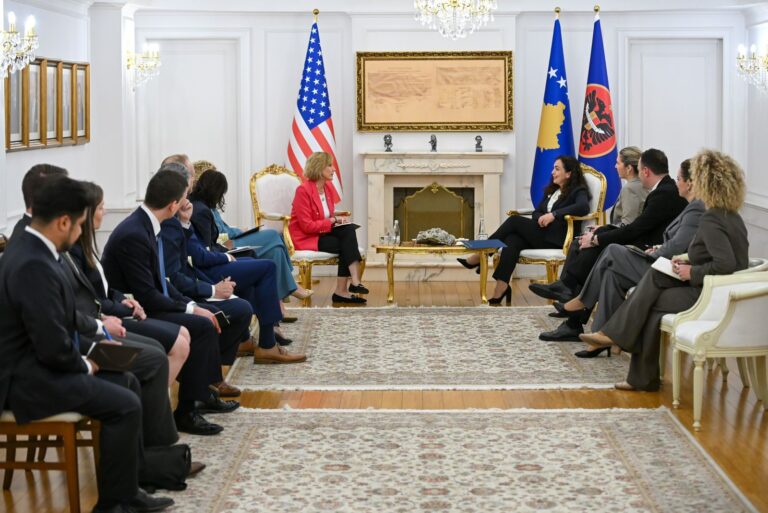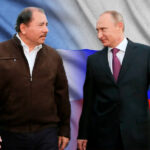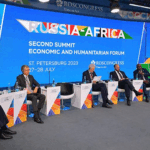As of August 8, Kosovo awaits another decision from the Constitutional Court, following the failure of its elected representatives—who emerged from the February 9 elections—to constitute the Assembly after 54 attempts. Until this legal decision is made, Kosovo remains mired in political crisis, with uncertainty looming over whether an agreement will be reached or if the country will head toward early elections.
Despite the absence of a functional government, lobbying efforts to finalize an agreement between Kosovo and Serbia—with mutual recognition at its core—have continued by internationals. In May, two U.S. Congresswomen, Republican Claudia Tenney and Democrat Chrissy Houlahan, visited both countries and jointly sent a compelling letter to President Donald Trump. In their message, they urged him to leverage his significant influence in the region to help facilitate a normalization agreement between Kosovo and Serbia—an outcome they believe would bring stability to the Balkans. They even proposed a potential visit to the region, accompanied by negotiations.
In their letter, the Congresswomen emphasized President Trump’s popularity in both Kosovo and Serbia, noting that his approval ratings in the region are among the highest in Europe. They concluded by asserting that with Trump’s direct involvement, a durable peace agreement and mutual recognition between the two countries is entirely achievable.
Whether this matter will be prioritized on President Trump’s immediate agenda remains uncertain. However, history has shown that U.S. involvement in Kosovo-Serbia relations has often led to significant developments. Crucially, any renewed engagement must include a clear articulation of the conflict’s origins—highlighting who the aggressor was and who suffered genocide. The narrative must not be rewritten to favor historical revisionism. Serbia has invested heavily in recent years in campaigns to distort the record of the wars in the Western Balkans, including attempts to obscure its role in the Srebrenica genocide and the broader conflict in Kosovo. The victims must not be forced to return to a battleground reshaped by propaganda.
Recently, President Trump has frequently referenced the Kosovo-Serbia relationship. During a meeting with NATO Secretary General Mark Rutte, Trump cited Kosovo and Serbia as one of several cases where he claimed to have prevented potential war. This statement may be an early indicator of a renewed diplomatic initiative led by the U.S. President.
Meanwhile, the letter send to president Trump by the two U.S. congresswomen has sparked backlash in Serbia. The “People Power” movement and other groups have urged the Serbian Ministry of Foreign Affairs to immediately distance itself from this initiative sent to Trump.
The effectiveness of Trump’s mediation efforts was previously demonstrated in the Washington Agreement, signed at the White House on September 4, 2020. This agreement, brokered by Trump, involved Serbian President Aleksandar Vučić and Kosovo Prime Minister Avdullah Hoti. In footage from the event—archived on the Trump White House YouTube channel —Vučić appears visibly uncertain about the contents of the document he was signing, especially when Trump mentions Serbia’s intent to transfer its embassy to Israel.Serbia later backed out of this commitment, citing changes in national interest following Israel’s recognition of Kosovo. Nonetheless, the agreement on the normalization of economic relations between Kosovo and Serbia was hailed as a success. Kosovo fulfilled nearly all its obligations under the deal, including establishing diplomatic ties with Israel, a move publicly announced the same day the agreement was signed.
As emphasized in earlier analyses, a direct and strategic intervention by the United States remains crucial to securing a final and lasting agreement between Kosovo and Serbia. The European Union, despite persistent efforts—including the proposal of the Franco-German Plan, which Kosovo has accepted in principle—has struggled to deliver a comprehensive and enforceable resolution. In this context, renewed U.S. engagement, potentially led by President Donald Trump, could revitalize the stalled dialogue and inject the political will necessary for progress. His earlier involvement in the Washington Agreement showcased the ability of American diplomacy to produce tangible outcomes even within a highly complex geopolitical environment.
Yet, any forthcoming agreement must extend beyond technical and economic normalization to confront the deeper historical and moral underpinnings of the conflict. Addressing the legacy of war crimes, affirming the aggressor-victim dynamic, and countering persistent efforts at historical revisionism by Serbian state narratives—are essential components for achieving a durable peace. International mediators must ensure that justice and historical truth are not sacrificed for the sake of expedient compromise.
Ultimately, the resolution of the Kosovo-Serbia dispute demands a multidimensional strategy—one that integrates principled diplomacy, international legal standards, and a long-term commitment to regional reconciliation. Whether it is Trump or another US representative appointed by Trump at the helm, the credibility of any mediation process will rest on its ability to secure not just diplomatic recognition, but also lasting stability and mutual trust. In an era of global uncertainty and growing geopolitical tensions, a renewed American focus on the Balkans—particularly on the Kosovo-Serbia issue—should not be dismissed as incidental. Rather, it represents a timely and strategic opportunity to achieve a long-overdue breakthrough in one of Europe’s most enduring conflicts.




